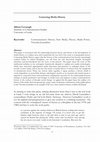Books by Allison Cavanagh
Papers by Allison Cavanagh
Sociological Research Online, 2000

MedieKultur: Journal of media and communication research, 2013
<p>This art... more <p>This article considers the usefulness of mediatization theories in historical studies of the media. Using a series of letters published in the UK newspaper The Times between 1885 and 1886 as an example, the article examines the way in which processes of mediatization developed alongside the institutions of social and cultural power by which they were reflexively constituted. On the basis of Hjarvard’s distinction between direct and indirect forms of mediatization, the paper looks at the ways in which the enunciation of moral authority and personal reputation were transformed by their incorporation into mediatized culture. At the same time, it is argued that mediatization is not a standalone process but is, rather, part of a wider set of social processes. The article reflects on the contribution of mediatization theories to developing a rounded picture of media history.</p>

Sociology Compass, 2009
Research into Internet communities and online behaviour constituted one of the earliest and most ... more Research into Internet communities and online behaviour constituted one of the earliest and most dynamic fields of interest in the new field of Internet studies. Studies focused a range of issues including understanding how social order was possible in mediated environments, the social and political dimensions of community, the impacts that online communities could have on their offline counterparts. At the same time, studies of Internet community provided Internet studies more generally with methodological innovations and new means of examining the new electronic worlds that had opened up. However, Internet community studies have been a victim of its own success to the extent that it has recently become fractured into a number of specialist arenas. As a consequence, the field has become both narrower and dominated by intractable problematics. However, recent research offers a new and revitalised agenda, focusing around the altering political status of community and new, and pressing questions have been opened up for the study of online community.
Sociological Research Online, 2013
This paper describes an analysis of poster and recommender activities in an online news forum. Qu... more This paper describes an analysis of poster and recommender activities in an online news forum. Quantitative analyses of patterns of posting and recommending suggest that claims about ‘horizontality’ and ‘online community’ are oversimplifications, as there is strong evidence to suggest that the actual workings of networked discussion communities incorporate a wide range of competing and mutually-contradictory orientations, activities and strategies. A qualitative analysis of particular posters’ rhetorical strategies provides evidence for the argument that an orientation to conventions (in particular using a dialogical mode of address) is more important than actual opinion or semantic content in gaining popularity. The implications of these findings, and some suggestions for how this work might be developed, are discussed.
Capital & Class, 2012
An analysis of commentary on the UK’s August 2011 riots reveals shifts in the way the media and p... more An analysis of commentary on the UK’s August 2011 riots reveals shifts in the way the media and politicians now construe concepts of youth, race, criminality and deprivation. By comparing the response to these events with that which followed the riots of 1981, these changes can be clarified and illuminated. This analysis reveals that discussions of ‘social problems’ exploited by ‘infiltrators’ (1981) have been replaced by notions of ‘pure criminality’ and ‘mob rule’. The implications of these changes for contemporary protest, and some ways in which the riots and other forms of protest can be related, are drawn out.
American Journal of Sociology, 2011

Westminster Papers in Communication and Culture, 2007
This paper is concerned with the relationship between theory and history in the development of me... more This paper is concerned with the relationship between theory and history in the development of media history as a subject area, and in particular the way that it has come to conceptualise power. Contesting Media History argues that the history of the communications has become increasingly isolated within its related disciplines, cut off from the rich theoretical insights developed elsewhere and provincialised into the 'story of the present'. The paper traces the roots of this intellectual isolation in the neologistic frameworks adopted to explain new media technologies, which have selectively appropriated media discourses and practices to underpin claims of the novelty of new media, and in the fact that much of media history is written from the standpoint of institutional actors. These two factors taken together, I argue, produce a history which is overly dependent on monolithic themes; teleological, insofar as an essential and eternal nature is imputed to successful forms and institutions; inadequately accounts for th e relationship between changes in media production and changes in media texts; and neglects to place communications history in the context of broader social change. As against this the paper traces the outlines of a history of the media 'from the ground up', using a study of alternate constructions of the public sphere in late Victorian journalism as an example of the way a more inclusive history could be developed.

In recent years there has been a large and diverse body of writing from scholars in the social sc... more In recent years there has been a large and diverse body of writing from scholars in the social sciences who have been studying changes brought about by new communication technologies in general and the Internet in particular. The question of how people behave, interact and organize themselves in relation to this form of communication has been given added prominence by developments within new social theory, especially in relation to the novelty of contemporary social formations and the importance of mass communications to this changed order. For the student new to the study of technology and society, there are a bewildering array of claims and counter claims, representing a spectrum of theoretical, methodological and critical sensibilities in relation to the Internet.In this new book Allison Cavanagh evaluates the work in this area by: investigating the novelty of the Internet and setting the Internet in the context of communication histories; and, evaluating the extent and rate of c...

Digital Sociology
‘Networks’, argues Barabasi, ‘are present everywhere. All we need is an eye for them’ (Barabasi, ... more ‘Networks’, argues Barabasi, ‘are present everywhere. All we need is an eye for them’ (Barabasi, 2003: 7). But, like beauty, the nature of a network, and what constitutes it, is in the eye of the beholder. In recent years there has been an upsurge of interest in understanding the properties and nature of networks. The authors Hardt and Negri in their analysis of the modern cultural condition have even argued that networks are a key isomorphism of the modern era. Just as, in Foucault’s terms, we can regard nineteenth-century social forms as organised around and dominated by the image of the prison, so the image of the network has come to be the key image of modern sociality. ‘Today’, they argue, ‘we see networks everywhere we look — military organizations, social movements, business formations, migration patterns, communications systems, physiological structures, linguistic relations, neural transmitters, and even personal relationships. It is not that networks were not around before or that the structure of the brain has changed. It is that the network has become a common form that tends to define our ways of understanding the world and acting in it’ (Hardt and Negri, 2004: 142).

Letters to the Editor
This chapter presents findings from a comparative study of a range of UK based newspapers of the ... more This chapter presents findings from a comparative study of a range of UK based newspapers of the nineteenth century. It examines the ways in which the practice of letter writing to national newspapers supported the development of citizenship as an extensive and multi-faceted project. Arguing against more restrictive versions of citizenship operationalised in Habermassian ideals of the public sphere, this chapter contends that much can be gained from applying wider ideas of the nature of the citizen that are emergent in analyses of contemporary reader participation. It examines the ways nineteenth-century readers understood the practice of writing letters to newspapers and the forms of power implied in this, going on to look at how nineteenth-century writers ‘performed’ citizenship. Finally, it considers the manner in which letter writers made the ‘personal’ into the ‘political’ and constituted public issues. In so doing, it challenges the idea that Letters to the Editor should primarily be considered as an adjunct to editorial policy, or as responses to already pre-constituted issues. Rather, letters allow us to trace how issues become politicised. This is considered in respect of the ways writers engaged with the idea of being a citizen of a state that was becoming more intimately entwined into their lives and also, by contrast, increasingly remote. Against this background, letters provided a resource for individuals in re-developing their sense of themselves as citizens, engaging with new forms of mediated empowerment.

MedieKultur Vol 29. No 54, 2013
This article considers the usefulness of mediatization theories in historical studies of the medi... more This article considers the usefulness of mediatization theories in historical studies of the media. Using a series of letters published in the UK newspaper The Times between 1885 and 1886 as an example, the article examines the way in which processes of mediatization developed alongside the institutions of social and cultural power by which they were reflexively constituted. On the basis of Hjarvard’s distinction between direct and indirect forms of mediatization, the paper looks at the ways in which the enunciation of moral authority and personal reputation were transformed by their incorporation into mediatized culture. At the same time, it is argued that mediatization is not a standalone process but is, rather, part of a wider set of social processes. The article reflects on the contribution of mediatization theories to developing a rounded picture of media history.

Research into Internet communities and online behaviour constituted one of the earliest and most ... more Research into Internet communities and online behaviour constituted one of the earliest and most dynamic fields of interest in the new field of Internet studies. Studies focused a range of issues including understanding how social order was possible in mediated environments, the social and political dimensions of community, the impacts that online communities could have on their offline counterparts. At the same time, studies of Internet community provided Internet studies more generally with methodological innovations and new means of examining the new electronic worlds that had opened up. However, Internet community studies have been a victim of its own success to the extent that it has recently become fractured into a number of specialist arenas. As a consequence, the field has become both narrower and dominated by intractable problematics. However, recent research offers a new and revitalised agenda, focusing around the altering political status of community and new, and pressing questions have been opened up for the study of online community.











Uploads
Books by Allison Cavanagh
Papers by Allison Cavanagh